How has collusion been defined?
- Published
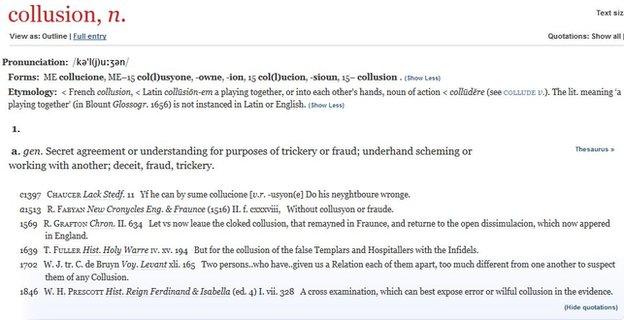
The complex web of paramilitary gangs, security and intelligence forces, agents and informers, in Northern Ireland during the years of conflict were not a consideration for dictionary compilers when they wrote the entry for collusion.
It has been left to others to come up with a definition that can be used to weigh the actions, omissions and behaviour of security forces in a series of murders in which they have been accused of collusion.
For some, a charge of collusion can only stick if there has been a secret agreement to deliberately and consciously plot to do something wrong.
For others the definition would also cover having a mindset that means that officers were predisposed to behave or think in ways that meant some people were less protected than they should have been, that investigations were frustrated to protect agents and informers, regardless of their actions.
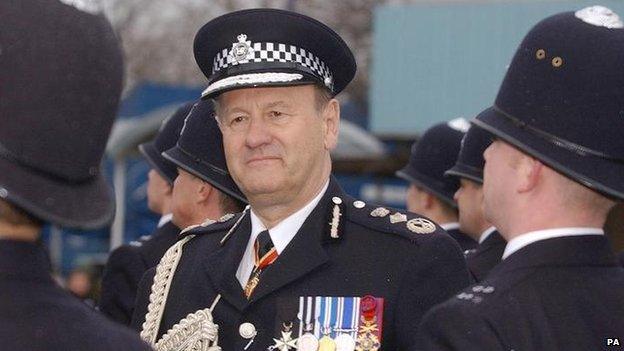
Sir John Stevens investigated allegations of collusion in several murders
The first official attempt at a definition was made by Sir John (now Lord) Stevens in 2003.
Lord Stevens, the then Metropolitan Police Commissioner, carried out a major investigation into collusion in several murders.
He said collusion ranges "from the wilful failure to keep records, the absence of accountability, the withholding of intelligence and evidence, through to the extreme of agents being involved in murder."
Applying that definition to his three inquiries he reported:
"The co-ordination, dissemination and sharing of intelligence were poor. Informants and agents were allowed to operate without effective control and to participate in terrorist crimes.
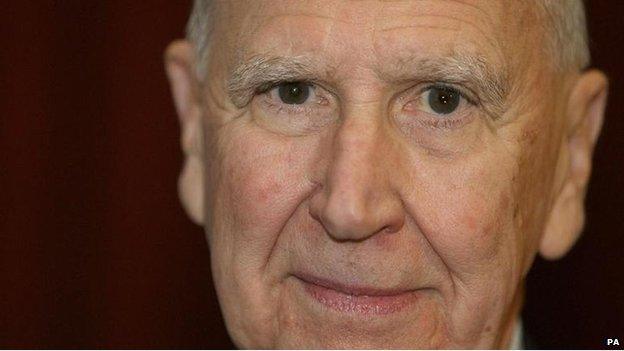
Judge Peter Cory established a broad definition of collusion
"Nationalists were known to be targeted but were not properly warned or protected. Crucial information was withheld from senior investigating officers. Important evidence was neither exploited nor preserved."
In 2004, Canadian judge Peter Cory published six reports into alleged collusion in murders in Northern Ireland.
In outlining his definition of collusion he highlighted several dictionary definitions of the word including "to co-operate secretly: to have a secret understanding."
He added definitions of connive, a synonym of the verb collude, including this entry from the Oxford Compact Thesaurus:
"to deliberately ignore; to overlook; to disregard; to pass over; to take no notice of; to turn a blind eye; to wink; to excuse; to condone; to look the other way; to let something ride."
'Connivance'
From the Webster dictionary, he quoted:
"To pretend ignorance or unawareness of something one ought morally, or officially or legally to oppose; to fail to take action against a known wrongdoing or misbehaviour - usually used with connive at the violation of a law."
He went on to write: "How should collusion be defined for the purposes of this inquiry?"
"There cannot be public confidence in any government agency that is guilty of collusion or connivance with regard to serious crimes. Because of the necessity for public confidence in government agencies the definition of collusion must be reasonably broad when it is applied to such agencies.
"That is to say that they must not act collusively by ignoring or turning a blind eye to the wrongful acts of their servants or agents or by supplying information to assist those servants or agents in their wrongful acts or by encouraging others to commit a wrongful act."
An inquiry into the death of Billy Wright, in the Maze prison in 1997, took issue with the emphasis on connivance.
"It may be that the very wide definition of the word collusion that Judge Cory adopted was due to his concentration on one of the synonyms, namely the verb connive," the inquiry report said.
"We have been concerned throughout the inquiry by the width of the meaning applied by Judge Cory, having in mind in particular that the word is not to be found in our terms of reference.
"For our part we consider that the essence of collusion is an agreement or arrangement between individuals or organisations, including government departments, to achieve an unlawful or improper purpose. The purpose may also be fraudulent or underhand."
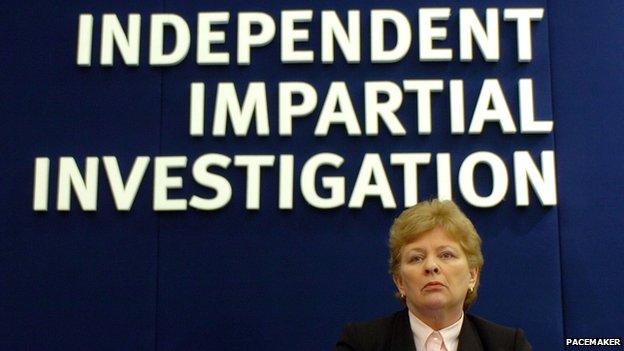
Nuala O'Loan concluded there had been collusion in the murder of Raymond McCord jnr
The first police ombudsman for Northern Ireland, Nuala (now Baroness) O'Loan adopted the definitions, in 2007, of Lord Stevens and Peter Cory to examine whether there had been collusion in the murder of Raymond McCord jnr.
Using those definitions, she concluded that there had been collusion.
Her successor as police ombudsman, Al Hutchinson, applied a less broad definition in his report on the attack, in 1971, on McGurk's Bar.
In the report he wrote: "The essence of collusion requires that a number of elements be present. Not only must there usually be an agreement between two or more parties, but there is also an additional requirement that a sufficiency of evidence exists to establish, on balance, that the act or omission complained of was deliberate and not merely negligent or inadvertent."
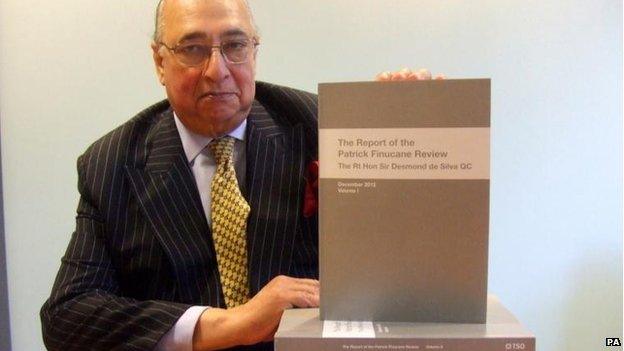
Sir Desmond de Silva reviewed the murder of Pat Finucane
In his review of the murder of Pat Finucane, Sir Christopher de Silva said he had adopted a "working definition" of collusion less broad than that of Judge Cory and more in line with that of the Billy Wright inquiry panel.
"I do believe, as Judge Smithwick has said in relation to his Tribunal, that omissions by state agencies must be considered alongside positive acts when drawing a definition of collusion.
"It is, however, important to stress that, in order to fall within the ambit of collusion, such omissions must be classified as deliberate and not merely represent examples of incompetence or inefficiency.
"My own working definition, whilst not purporting to be definitive, is one I consider appropriate in relation to the allegations made and for the purposes of this particular case.
"I consider collusion to involve:
(i) agreements, arrangements or actions intended to achieve unlawful, improper, fraudulent or underhand objectives; and
(ii) deliberately turning a blind eye or deliberately ignoring improper or unlawful activity."
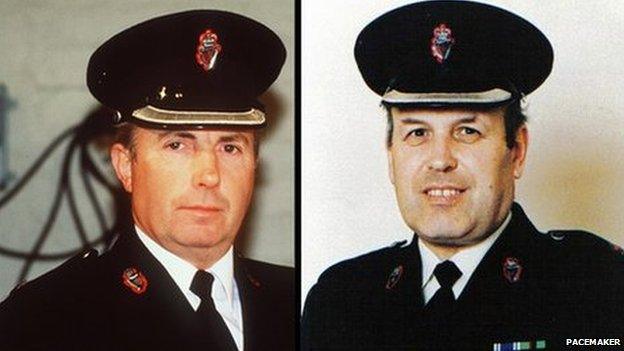
Judge Peter Smithwick found there was Irish police collusion in the IRA murders of RUC officers Chief Supt Harry Breen and Supt Bob Buchanan
Irish judge Peter Smithwick gave a similar definition of collusion to that of Peter Cory.
Smithwick, investigating allegations of Garda collusion in the murders of RUC officers Chief Supt Harry Breen and Supt Bob Buchanan, said:
"While (collusion) generally means the commission of an act, I am also of the view that it should be considered in terms of an omission or failure to act.
"In the active sense, collusion has amongst its meanings to conspire, connive or collaborate.
"In addition I intend to examine whether anybody deliberately ignored a matter, or turned a blind eye to it, or to have pretended ignorance or unawareness of something one ought morally, legally or officially oppose."